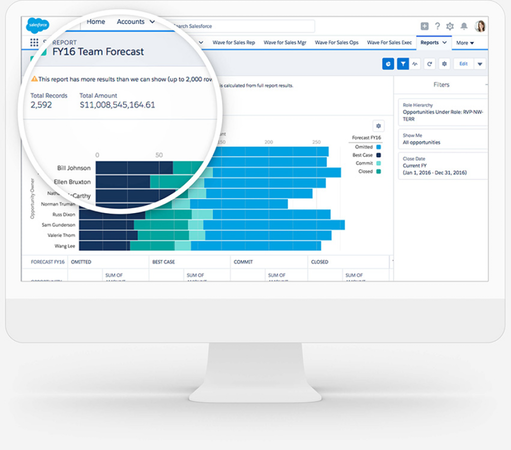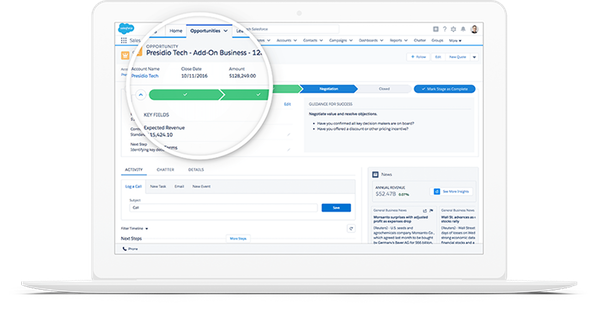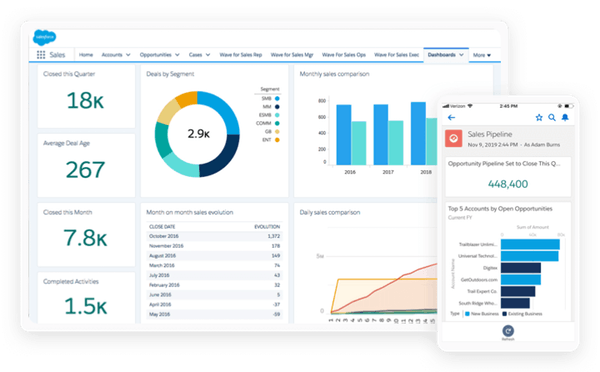
Vendor:
Founded:
Headquarters:
Salesforce
1999
San Francisco, CA
Customers:
Deployment Model:
Free Trial:
150,000+
Cloud
Yes
Sales Cloud At A Glance
Product Overview
Salesforce Customer 360 is an integrated cloud-based CRM platform that provides customers the option of purchasing individual solutions that best fits their business needs. This review will focus on the Salesforce Sales Cloud software.
Salesforce Sales Cloud helps companies’ sales teams efficiently manage their pipeline in order to close deals quickly. Sales reps can track their interactions with each prospect, create quotes and contracts, and analyze revenue generated and other metrics. Sales managers can rely on the software to monitor each rep’s performance and guide them into exploring new sales territories.
Salesforce Sales Cloud has several benefits, such as:
- Automated and standardized tasks, so sales reps can focus more on selling
- Accessibility from anywhere, even offline
- Robust search functionality
- Easier collaboration within the sales team
- Real-time actionable insights for improving sales performance and forecasting trends
- Scalable pricing tiers for any business size
Salesforce also offers add-on solutions, such as Pardot (B2B marketing automation), Salesforce CPQ & Billing (quotes/contracts), Lightning Dialer (inbound and outbound calling), Inbox (calendar and email access directly from Salesforce) and Sales Cloud Einstein (artificial intelligence functionality).
Features
Here are the key features of Salesforce Sales Cloud.
Account/contact management – Salesforce Sales Cloud provides comprehensive view of each account, including multiple contact names per organization, email addresses, phone numbers, notes and historical activities. Sales reps can search for a specific company name or contact and update the data within each account. They can also access another rep’s account if that rep is unavailable and the prospect needs a quick answer. This feature integrates with Twitter, Facebook and LinkedIn, so reps can monitor any mentions of their company on a customer’s social feed via Salesforce and provide comments or answers.
Opportunity management – Sales reps can track their pipeline at each stage using the activity timeline. They can view information on competitors, keep their team updated on their progress and send emails to prospects. There’s also a built-in quote feature that populates a quote with relevant customer and product data and generates a PDF for email sending.
Lead management – This feature allows sales reps to convert new leads into opportunities by tracking them from each marketing campaigns in different channels (e.g., social media, email, web). Managers can set up lead scoring and routing so that each lead automatically goes to a specific sales rep.
Reports and dashboards – Sales reps have their own personalized dashboard that shows metrics, such as account activity and quotas. Sales Cloud also includes customizable reporting tools with a drag-and-drop interface and data filtering.
Sales forecasting – This feature gives sales managers a real-time view of their pipeline, including their team’s performance. They can track each rep’s quota target and make adjustments to their goals as needed. There’s also an overlay splits feature that helps sales teams with complex needs (e.g., B2B sales) credit the right revenue/opportunity to the appropriate rep.
Other features – Additional features of Sales Cloud include a mobile app, Outlook/Gmail integration, the ability to upload and share documents and data cleaning. Managers can create automated approval workflows and other business workflows using the drag-and-drop process builder.
Target Market
Salesforce targets all company sizes in many industries, such as retail, finance, health care, media, manufacturing, higher education and nonprofit. We’ve listed 10 of its customers below.
- Adidas
- ADP
- Amazon Web Services (AWS)
- Farmers Insurance
- Land O'Lakes Inc.
- Southwest
- State Farm
- T-Mobile
- Transamerica
- Zillow
Implementation/Integration
Salesforce’s accelerated Jump Start implementation program allows customers to deploy the software quickly. The program’s specific timeline and cost can vary based on the software the customer purchases.
The Jump Start program for Sales Cloud can be deployed in under two weeks at a cost of $5,000. Customers participate in eight meetings (totaling six hours) with the Salesforce implementation team, including a kickoff call and discussions about lead management, opportunity management and account management features. They also receive up to three customer shadowing sessions (about 45 minutes each) where they can watch the Salesforce expert configure their software and ask questions.
Organizations with more complex needs can work with Salesforce’s Advisory Services team.
Customer Service & Support
Salesforce offers three support plans.
- Standard – The Standard plan is included in each Salesforce subscription. It includes guided journeys (users learn best practices and other basics of Salesforce), Learning on Trailhead (online training paths for users, developers and administrators), a Trailblazer Community forum and a two-day response time from tech support.
- Premier – The Premier plan costs an additional 30% of net. It has all the features of the Standard plan, plus phone support, one-hour response times for critical issues, outcome-based Expert Coaching sessions (one-on-one work sessions with Salesforce experts on onboarding, implementation and optimization), developer support, personalized success paths, discounted pricing for the Trailhead Academy public classes, business value reviews and technical health reviews.
- Signature – The Signature plan includes all the features of the other two plans, plus deployment planning services, proactive services (24/7 proactive monitoring, early alerts), technical account management and key event management. Pricing is based on a client’s complex needs, so you’ll need to contact Salesforce for a custom quote.
Pricing
Salesforce Sales Cloud has four pricing tiers.
Essentials – At $25 per user, per month, the Essentials tier targets companies with up to 10 users. It includes basic features, such as lead management, account/contact management, opportunity management, a mobile app, customizable reports and dashboards, collaboration, cross-selling/upselling functionality, the ability to automate up to five processes and forms each, and integration to Google Apps and Outlook.
Professional – At $75 per user, per month, the Professional tier is intended for companies of any size. It includes all the features of the Essentials tier, plus rules-based lead scoring, up to three campaigns per opportunity, sales forecasting, quotes and orders, unlimited custom applications, a developer sandbox and the ability to sync Salesforce calendar with Microsoft Exchange.
Enterprise – At $150 per user, per month, the Enterprise tier offers all of the features of the other two plans, plus up to five campaigns per opportunity, advanced sales forecasting features, unlimited customizable profiles, unlimited roles and permissions, unlimited record types per object, a partial sandbox and integration via Web Services API.
Unlimited – At $300 per user, per month, the Unlimited tier has all the features of the other three tiers, plus a full sandbox for trying new features.
Add-ons: As mentioned, Salesforce also has several add-on solutions. Sales Cloud Einstein is $50 per user, per month. Pardot starts at $1,250 per month for up to 10,000 contacts. CPQ & Billing costs $75 per user, per month.
Shortcomings
There’s an initial learning curve, especially for sales reps that have never used a CRM before. Also, users find that the robust search functionality can get overwhelming at times.
Screenshots
About
Salesforce got its start in 1999 as a sales automation software and has evolved into a global CRM market leader. Its mission is helping businesses run their operations efficiently and providing top-notch customer service. Salesforce stands by four core values: trust, customer success, innovation and equality.
Salesforce has received many accolades over the years, such as the IDC #1 CRM (2013-2019), Fortune‘s Most Admired Companies (2013-2019) and Forbes‘ Most Innovative Companies in the World (2018). Fortune also lists Salesforce as one of the 100 Best Companies to Work For every year since 2008.
Salesforce is headquartered in San Francisco and has many locations in the United States and throughout the world.





